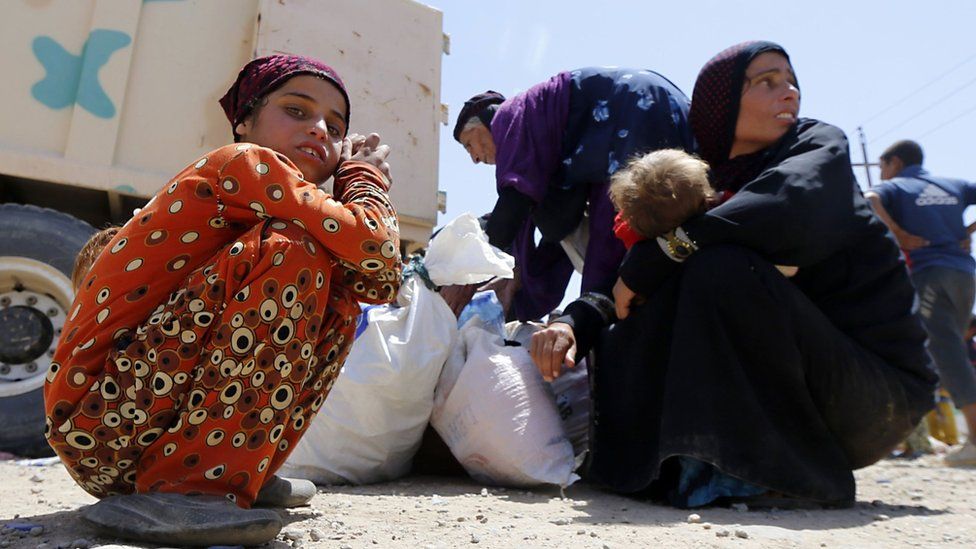Iraq Mosul offensive: Civilians 'in grave danger' - UN
- Published

Civilians are being hit hardest as Iraq's military assault on Mosul enters its final phase, the country's UN humanitarian relief co-ordinator says.
Lise Grande told the BBC residents were in grave danger as so-called Islamic State (IS) was directly targeting families.
Many people in the city are already facing severe shortages of water and electricity.
Iraqi forces say they have recaptured several villages from IS militants.
Troops have been trying to drive IS fighters out of the last remaining strongholds they control in Mosul's Old City.
Hundreds of thousands of civilians have fled the northern city since the offensive to reclaim it was launched in October last year.
At the scene: Nafiseh Kohnavard, BBC Persian, Old City frontline
Federal Police snipers covered us as we moved forward, heading to the frontline. Gunfire echoed around the streets. Every few minutes, a mortar exploded nearby.
Soon the streets were too dangerous, so we moved from house to house through holes in the walls.
Major Ali of the sniper brigade told the BBC real time intelligence was crucial.
"There are still many civilians there, most of them hiding in their basements and running out of food."
From our position we could see the iconic Al-Nouri mosque - where IS leader Abu Bakr al-Baghdadi had addressed crowds after announcing the caliphate.
"They won't give up on this mosque," Major Ali said.
"They will fight till they die and will use civilians in every way they can to slow us down."
Ms Grande said that the next part of the assault was going to be the hardest.
"Civilians are going to be at the most extreme risk they have been during the entire campaign," she said.
"We know that ISIL [IS] is directly targeting families as they try to escape, we know that there are very limited stocks of food and medicines, we know that there are severe shortages of water and electricity.
The dilemma facing forces taking on Islamic State in Mosul
"All of the evidence points to the fact that the civilians who are trapped in these neighbourhoods and districts are in grave danger."
One recently rescued civilian, Homira, told the BBC's Nafiseh Kohnavard she had "almost died of hunger".
"We felt like we were in a prison. We had to stay for days in our basement. When we saw the Iraqi forces it was the happiest moment of our lives."
The government announced the recapture of eastern Mosul in January but the fight for complete control of the western half continues.
Thousands of Iraqi security forces, Kurdish Peshmerga fighters, Sunni Arab tribesmen and Shia militiamen, assisted by US-led coalition warplanes and military advisers, are involved in the offensive.
Earlier this month, coalition officials estimated the number of militants in Mosul to be fewer than 1,000 - compared with 3,500 to 6,000 militants in and around the city before the offensive began last October.
The UN has said the battle has left more than 8,000 civilians dead or wounded, but that figure only comprises people transferred to medical facilities.
Iraq's military does not release casualty figures, but US Gen Joseph Votel told a Congressional hearing at the end of March that at least 774 Iraqi security personnel had been killed and 4,600 wounded.
More than 580,000 civilians have also been displaced by the fighting, among them 419,000 from western Mosul, the Iraqi authorities say.
- Published26 May 2017
- Published22 May 2017
- Published23 May 2017